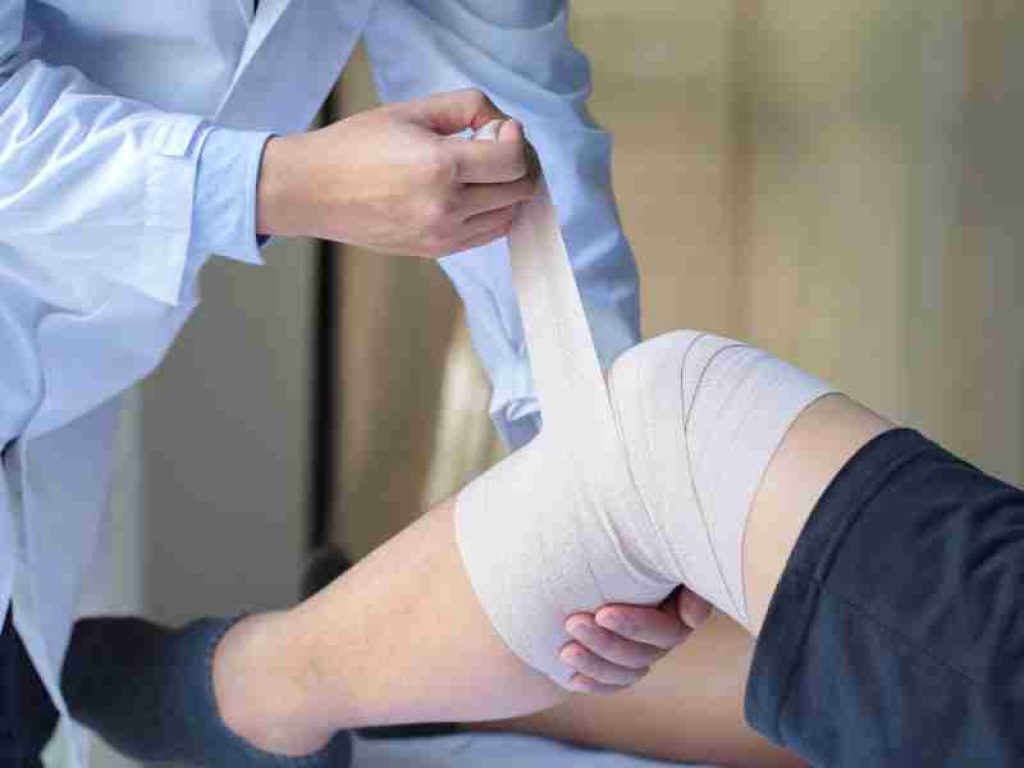
How To Become An Orthopedic Nurse Practitioner?
The ultimate professional achievement for many nurses is to become an orthopedic nurse practitioner. It cannot be easy to narrow down your career goals as a nurse practitioner due to the wide variety of available specializations.
This article will define orthopedic nurse practitioners, discuss the educational and professional requirements for becoming one, and provide an estimate of the salary range for this profession.
What is an Orthopedic Nurse Practitioner?
When treating and caring for patients with musculoskeletal issues, an orthopedic nurse practitioner is the one to see. The skeletal system, the muscles, the joints, and the connective tissue that holds it all together can all be affected by disease and injury.

Musculoskeletal issues can happen for various reasons – from diseases and traumas to congenital malformations. Brace yourself for some common culprits like arthritis, fractures, sprains, muscular dystrophy, temporomandibular joint disease, and fibromyalgia.
Few nurse practitioners in the United States specialize in orthopedics, but those who do have extensive education and experience in the field. In the third portion, we’ll get into the specifics of how to become one.
What does an orthopedics nurse practitioner do?
A nurse practitioner specializing in orthopedics treats patients with rheumatoid arthritis and other musculoskeletal diseases. They read X-rays, run tests, write prescriptions, and prepare patients for surgery. Nurse practitioners in orthopedics play an integral role in coordinating patient care, treatment, and consultations, working closely with physical therapists, surgeons, and other nurses.
The duties of an orthopedics nurse practitioner may include, but are not limited to, the following:
- Evaluating patients in a clinical or hospital setting.
- Providing relief for musculoskeletal discomfort.
- Injecting joints, fitting splints, or casting broken bones.
- Assisting with orthopedic operations and treatments, such as the repair of fractured bones and joints.
- Scheduling imaging lab tests or other diagnostic procedures.
- Speaking with and working with other healthcare team members, such as the nurse on staff, the doctor, and the dietitian.
- Keeping tabs on how well a patient is responding to treatment.
- Preparing patients for treatments and surgeries.
- Scheduling patients for surgery and liaising with the surgical unit and healthcare system.
What is the work environment of Orthopedic Nurse Practitioners?
The scope of practice for orthopedic nurse practitioners is broad. They are most frequently found in the following places:
- Hospitals
- Operating Rooms
- Pain Management Centers
- Emergency Room
- Military
- Occupational Health and Safety
- Rehabilitation Medicine
- Workplace Safety and Health
- Radiological facilities
- Long-term care facilities
- Manufacturers of medical supplies
- Hospice
- Palliative care
- Community health clinics
- Public health facilities
- Hospitals & Clinics
- Walk-in clinics
- Companies that provide medical care to patients in their homes
- Governmental organizations
- Medical Transportation & Evacuation Services
- Private residences offering medical care
- Universities and government research labs
- Private practice
- Telephone call centers
- Clinics in rural areas
- Medical facilities run by nurses
- Academia
- International health missions
The schedule of an orthopedic nurse practitioner (NP) will change with the needs of the facility where they work. In some instances, nurses may work a shift schedule in addition to their 40-hour workweek. For orthopedic surgeries, others will have to take call time. Talking to the employer about the expected timetable is crucial.
What are Common conditions treated by orthopedic nurse practitioners?
Orthopedic nurse practitioners specialize in the treatment of the musculoskeletal system and provide care for various conditions. Patients may seek their services for a range of issues.
- Arthritis
- Fractures and dislocations
- Carpal tunnel syndrome
- Fibromyalgia
- Joint replacements
- Osteoporosis
- Arthritis rheumatoid
What does an orthopedic nurse practitioner specialize in?
Nursing offers a wide range of specialties, making it a fascinating field of study. There is no exception for orthopedic nurse practitioners. You can choose a specialty based on your interests and abilities. Orthopedic nurse practitioners (NPs) come in various shapes and sizes.
- Foot and ankle surgery
- Reconstruction of the joint
- Musculoskeletal congenital disabilities
- Neuromuscular diseases
- Spinal fusion
- Sports Medicine
What are the skills of an orthopedic nurse practitioner?
As an orthopedic nurse practitioner, you’ll need a wide range of expertise to provide excellent patient care. Interprofessional, leadership, and clinical competencies are all included. Lack of any of these could compromise the quality of treatment given to the patient. This list of essential competencies for an orthopedic nurse practitioner is presented in no particular order.
Teamwork:
In many facets of healthcare, including orthopedics, teamwork is essential. When a patient is being treated for a musculoskeletal issue, it is not unusual for several different professionals from different fields to work together to give them the best possible care. The orthopedic NP must be an engaged and optimistic team member to give the patient the greatest potential outcome.
Strong communication abilities:
Teamwork and communication go hand in hand. To provide the best care for the patient, the orthopedic N.P. must coordinate with a multidisciplinary team. Effective communication is essential in the orthopedic nurse practitioner’s role, as they explain diagnoses and treatment plans to patients and their families. By fostering good communication, the patient’s outcome can be improved.
Professional Growth:
The orthopedic N.P. must constantly strive for professional development. Goal-setting is essential for an orthopedic nurse practitioner who wants to advance their career. This may be required every year, but even if it’s not, it’s a good idea to do it so you can keep improving as a practitioner. This is accomplished through professional development, which involves earning multiple CEUs, which enables you to hone existing abilities, pick up new ones, and keep up with developments in orthopedics and healthcare.
Clinical Competence:
The orthopedic N.P. should possess clinical abilities and be competent, self-assured, and evidence-based when providing care. They must be able to assess and diagnose various musculoskeletal issues and know how to treat them. Proficiency in evaluating diagnostic imaging results, including determining the subsequent steps for the patient, is essential.
They must be able to check for signs of infection in surgical incisions after healing. An orthopedic nurse practitioner (NP) must be able to suture wounds, apply and remove casts, and identify the best brace or splint for each patient’s condition.
How to become an orthopedic nurse practitioner?
Becoming competent in this field takes a lot of schooling and practice. Become an orthopedics nurse practitioner by following these steps:
Get your bachelor’s degree:
Obtaining a Bachelor of Science in Nursing is the first step toward a career as an orthopedics nurse practitioner (BSN). This undergraduate degree program normally takes four years to finish. If you already have an ADN, you can complete a Bachelor of Science in Nursing (BSN) program in as little as 20 months.
Pass the NCLEX-RN exam:
To become a registered nurse in the United States, you must earn a bachelor’s degree before applying for the NCLEX-RN exam. Your understanding of nursing theory, practice, and ethics will be tested in this exam. You can make an appointment to take the test online. Your eligibility to practice as a registered nurse is contingent upon passing the National Council Licensure Examination for Registered Nurses (NCLEX-RN) (RN).
Pursue a master’s degree:
Candidates for certification as an Orthopedic Nurse Practitioner must hold a Master degree in Nursing, according to the Orthopedic Nurses Certification Board (MSN). These courses normally take between 18 and 24 months to complete. To get certified as a nurse, you must enroll in a program approved by the Commission on Collegiate Nursing Education or the Accreditation Commission for Education in Nursing.
Become licensed:
After completing your Master of Science in Nursing program, you can pursue certification in orthopedic care by enrolling in a specialized program. Exam for Orthopedic Nursing Certification (ONP-C) is required to obtain a license.
Your clinical abilities and knowledge in areas such as sports injuries, metabolic bone diseases, and orthopedic trauma are evaluated by this skill-based test. You may register for the test if you meet the requirements listed below.
Experience as an R.N. or APRN for at least three years
- A master’s degree or higher from a recognized institution.
- At least 2,000 hours of nursing experience working with patients with musculoskeletal disorders.
- Possession of a current and valid nursing license.
Keep your license maintained:
Your ONP-C certification is valid for five years. According to the Orthopedic Nurses Certification Board, it would help if you got continuing education credits to keep your license active. For licensure, your state may have additional requirements. To keep your license active, check with your state to see if you need to acquire more CEUs.
What do orthopedic NPs need for continuing education?
Depending on the state of licensing, CEU requirements will differ. Continuing education credits are mandated for each state where a practitioner holds a license. A minimum of 75 contact hours of specialty-specific C.E. are typically required of N.P.s (orthopedics). Other certificates may necessitate more CEU hours.
What are closely related fields of an orthopedic nurse practitioner?

You still have options if you want to help people with musculoskeletal conditions and injuries but want to avoid becoming an orthopedic nurse practitioner. Physical therapists are another profession that uses similar abilities and is closely related.
To help patients manage their pain and increase their mobility, these healthcare experts work with sick and disabled patients. Physical therapy is typically a necessary element of recovery for patients who have undergone joint replacement surgery.
How much does an orthopedic nurse practitioner make?
According to Payscale’s August 2022 report, the average salary for an orthopedic nurse practitioner was $100,035, with an hourly rate of $43.90, suggesting a financially beneficial nursing profession. The compensation for an orthopedic nurse practitioner might take the form of an annual salary or an hourly rate. Depending on where you work, this will change.
If you’re paid by the hour, you’re lucky – overtime pay is on the table! But if you’re a salaried worker, don’t fret – charm the hiring committee and negotiate your way to that sweet time-and-a-half. Earning potential in nursing is correlated with education and years of experience.
What are the job opportunities for orthopedic nurse practitioners?
According to the U.S. Bureau of Labor Statistics, there is a positive outlook for Nurse Practitioners. The current number of N.P.s in the United States as of 2021 is 300,000, with an anticipated need for 118,600 more by 2031. There has been a 40% increase.
Despite the Bureau of Labor Statistics not distinguishing between various types of N.P.s, orthopedic N.P.s will continue to be in demand as the baby boomer population ages. The National Center for Health Workforce Analysis (NCHWA) predicted a 20,000-person physician shortage by 2025. Orthopedic nurse practitioners can fill this gap.
FAQ’s
Are orthopedic nurses in demand?
Due to the aging population and longer life expectancies, the demand for orthopedic treatments has increased, leading to a high demand for orthopedic nurses and potentially greater job security in this specialization compared to others.
What do I need to work as an orthopedic nurse?
An Orthopedic Nurse Practitioner must have completed between six and nine years of schooling and work. The time it takes to complete a master’s degree at an approved institution varies from student to student. As an illustration: Earning your BSN degree could take three to four years of full-time study.
What does orthopedic nursing necessarily involve?
Orthopedic nursing involves helping and caring for patients who have suffered bone fractures or joint dislocations. A student in this field will learn about pain management, joint injuries, and pediatric orthopedic conditions.
Why choose orthopedic nursing?
As an orthopedic nurse, you’ll get to ease the suffering of people who have suffered serious injuries or chronic diseases. In addition to maintaining bandages, casts, and drains, they can rapidly engage with patients and encourage them.







